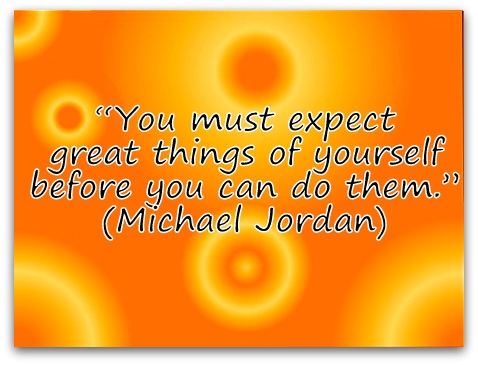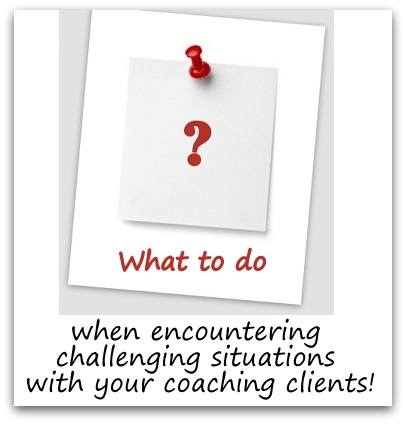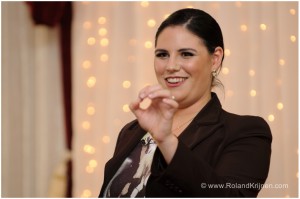Coaching Quote of the Day 7th December 2012

“You must expect great things of yourself before you can do them.”
(Michael Jordan)

“You must expect great things of yourself before you can do them.”
(Michael Jordan)
Coach Frederique Murphy shares her experience and thoughts in today’s guest post.

This is my fifth guest blog post, and as with every blog posts, I thrive to tackle topics that might not necessarily be often tackled! Earlier this year, when Jen and I discussed the dates for my blog posts, I told her that I knew exactly what my final 2012 blog post would be, and here it is! In this article, I want to talk about, the events when you, as the coach, encounter some challenging situations with your coaching clients.
After close to 5 years of coaching, I can say that I have encountered all of these; and, yes, I am saying it out loud, and publically: it is actually rare for coaches to talk about these situations, even though, they happen. I want to break that pattern, and help you through these. I believe that these situations have either happened to you, or might happen in the future as you continue to stretch and grow yourself and your coaching practice. I also want to say upfront that in most cases, these situations are not a negative reflection of your coaching services. But, as these are often unspoken, when they happen, many coaches feel it was their fault and go into a shame/guilt/unworthy destructive cycle.
So, let’s openly talk about these, and see how we can shift and move forward.
Your coaching client does not “show up”.
And, I don’t mean physically! You know, when they sign up to your coaching programme, and, somehow, don’t “show up”; they might arrive late to your sessions, they might not listen to your programme classes, they might not read your emails, they might not open your attachments, they might not reply to you, etc, etc, etc; these type of things. You know, as the coach, that showing up and playing fully is critical to their success; your coaching programme might be one of the best programmes out there, and yet, it will not do anything for them if they don’t utilised it. It is a challenging situation, as you know that they are not utilising the programme, and know they would get even more out of it, should they do, of course.
So, what do you do? Address it with them, and I suggest to invite them to an additional session (I’d not address this during one of their coaching sessions), but keep it separate and frame the session to find out how they are getting on. There will be 3 scenarios:
Your client does not take actions.
This is a similar situation, as the first one. Here, something for you to be very clear about is that acting is 100% their responsibility; they will not get results if they don’t act, and you cannot guarantee them results, as you are not the ones taking the actions. So, it comes down to their actions
So, what do you do? Address it with them, and I suggest to invite them to an additional session (again here, I’d not address this during one of their coaching sessions), but keep it separate and frame the session to find out how they are getting on, and share your concerns with them. See where this conversation leads you; ultimately, it will once again be up to you, and you might be a coach, who is not happy working with clients not taking actions, and decide to end your relationship.
Your coaching client does not like it when you push their buttons.
Another challenging situation, right? I want you to ask yourself: is pushing buttons part of your role as a coach? I believe it is, in fact, an integral part of your coaching; when something needs to come out but does not, you might need to make it come out and however way you will do it, it might cause the client to feel the heat; you are not their friend, you are their coach, and your outcome is to do whatever is needed to support them, and sometimes supporting them means to push some buttons to get them moving forward.
So, what do you do? Address it with them, and I suggest to invite them to an additional session (again here, I’d not address this during one of their coaching sessions), but keep it separate and frame the session to find out how they are getting on. This will enable you to openly discuss and see how your coaching client is, and to (re)share with them your role, values and practices. However way you do it, I want to strongly emphasise the fact that I believe you should not change your style to suit your clients. In my previous article Mirror, Mirror On The Wall, Who Is The Best Of Them All? I talked about coaching styles, and reminded you that “Your coaching style will be the best for some, and completely clash for others.” And this is what might be happening. During your conversation, you will either decide to make it work, or to end the relationship if you feel this is not going to work. Again here, it is entirely up to you.
Your client expects ABC, and you give them XYZ.
This situation is another challenge in itself! When you are coaching your client, your key outcome is to coach them to the best of your ability. You come to their sessions, without any agenda. However, very often, your coaching client will come to their session with their agenda, their ABC. And, here is what happens; they want ABC, but, for whatever reason, they also come in with a bunch of “stuff”, and you, as the coach, make a judgement call, in tackling the stuff, as you professionally know that once it is tackled, it will make it easy to then move their focus onto ABC; so, you do, XYZ, as you feel, it is what will best support your coaching client in that session. The thing is, they don’t know what’s going on, they are not trained as coaches, so from their point of view, they’ll see things as wanting to get ABC, but getting XYZ instead; and it might well have been that XYZ created huge shifts and breakthroughs, but, it was not ABC, bottom line, they did not get what that wanted.
So, what do you do? In this case, I believe, that instead of being a “what do you do?” question, it is actually a “what can you do post-session? question. Because, you did what you decided was best at the time of the session, so now, it is looking into the post-session follow-up to ensure your client remains satisfied. It has happened to me a couple of times, and should these scenarios happen again, I would do exactly the same things, as in, do the XYZ first and then, deliver a post-session action to ensure you address the ABC.
While these situations are challenging to face, I actually believe that experiencing these scenarios will make you a stronger coach, as each of these will be beneficial to your growth. You will learn from each of these, and if necessary, refine some of your internal and external processes, that will make your practice stronger too. Now, for this to happen, and for you to be able to view these situations as something positive along your journey, you need to ensure that as these happen, you discuss them with your own coach, so that he/she can help you through these. This is very important.
This is not an exhaustive list, and the recommendations I am giving are the ones that have worked for me; but there are plenty of other ways to tackle these challenging situations. Remember, the key thing is that you should do whatever you think is best for you and your client; I truly believe that facing these situations head on is the best first step. Be proud of who you are as a coach, and stand by your practice.
Have you ever encountered one of these 4 challenging situations with your coaching clients? What did you do? I’d love for you to share, this will be so helpful for other coaches. Comment below!
 Frederique Murphy (@IrishSmiley on twitter) is a mindset strategist, who founded her business to focus on her passion: transformation! Thanks to her Mountain Moving Mindset programme, Frederique empowers individuals, corporate executives and business owners to master their mindset, so that they can move mountains and bring their life, career and business to a whole new level! She shares her M3 Power through her coaching & mentoring packages, her published books & articles, her award-winning blog and newsletters, and her unique live events. For more information on Frederique’s transformational range of products and services, visit FrederiqueMurphy.com, get your free M3 Power, and start climbing now!
Frederique Murphy (@IrishSmiley on twitter) is a mindset strategist, who founded her business to focus on her passion: transformation! Thanks to her Mountain Moving Mindset programme, Frederique empowers individuals, corporate executives and business owners to master their mindset, so that they can move mountains and bring their life, career and business to a whole new level! She shares her M3 Power through her coaching & mentoring packages, her published books & articles, her award-winning blog and newsletters, and her unique live events. For more information on Frederique’s transformational range of products and services, visit FrederiqueMurphy.com, get your free M3 Power, and start climbing now!
In this week’s guest post Frederique Murphy shares her expertise and shares her advice to coaches.
And before, you start shouting at me (!) in front of your screen, let me add, “During sessions”.
This is something that comes up often in my work with coaches, and I thought it would be a great topic to guest blog about, for Jen at Coaching Confidence.
So, here it goes: During sessions, you are not their friend, you are their coach.
And, before reading any further, take a few seconds to check in internally and become fully aware of what comes up for you, as clarity and consciousness always help us more forward. Whatever is coming up is good, and are things for you to be aware of, so that you can do something about it.
When it comes to roles, it is important to lay out some boundaries, and to stick to these; let’s take a look at the various scenarios and roles.
Life -context, as in, outside sessions = can you and your client be friends?
Yes AND No
The choice is up to you, it is a personal choice; and, it will probably depend on the client too, I think this is a grey area with no straight answer; in the end, it is entirely your choice. You may be comfortable being friends outside, or you may not; it is up to you to decide on your terms; you decide on your role or roles, and as a result, on the relationships you are having with the people surrounding you.
Business -context, as in, during sessions = can you and your client be friends?
Yes, you can, BUT…
I believe that bringing in the friendship has consequences. And, I base my answer on the following scenarios, and it is not an exhaustive list.
I truly believe that during sessions, you as the coach, definitely need to put your coach hat on, and leave outside the friend one, as this is what your client has signed up for.
![]() As a coach, you want to be objective and neutral as this is what your client needs from you; as a friend, sometimes, you would leave the objectivity at the door as this is not what your friend needs.
As a coach, you want to be objective and neutral as this is what your client needs from you; as a friend, sometimes, you would leave the objectivity at the door as this is not what your friend needs.
![]() As a coach, you want to be able to say the things that your clients needs to hear, no matter how uncomfortable it might be for them; as a friend, sometimes, you simply want to be there for them, as this is what your friend needs.
As a coach, you want to be able to say the things that your clients needs to hear, no matter how uncomfortable it might be for them; as a friend, sometimes, you simply want to be there for them, as this is what your friend needs.
![]() As a coach, you want to interrupt the patterns you are noticing in your clients, even if that means to interrupt them verbally; as a friend, sometimes, you want to lend a listening ear, as this is what your friend needs.
As a coach, you want to interrupt the patterns you are noticing in your clients, even if that means to interrupt them verbally; as a friend, sometimes, you want to lend a listening ear, as this is what your friend needs.
![]() As a coach, you want the best for your client and are ready to push the buttons that need pushing; as a friend, sometimes, you will not say what you have in mind as you want to be liked, and you will fear hurting their feelings.
As a coach, you want the best for your client and are ready to push the buttons that need pushing; as a friend, sometimes, you will not say what you have in mind as you want to be liked, and you will fear hurting their feelings.
![]() As a coach, you want to hold your client accountable to what they told you they would do, and will not accept any excuses; as a friend, sometimes, you will be there and accept the excuses as this is what your friend needs.
As a coach, you want to hold your client accountable to what they told you they would do, and will not accept any excuses; as a friend, sometimes, you will be there and accept the excuses as this is what your friend needs.
![]() As a coach, you want to be there for your client, and that means leaving your own “stuff” at the door; as a friend, sometimes, you will not be able to be there, as you have your own stuff to deal with.
As a coach, you want to be there for your client, and that means leaving your own “stuff” at the door; as a friend, sometimes, you will not be able to be there, as you have your own stuff to deal with.
![]() As a coach, you want to challenge and stretch your client, and it might mean “pushing” them to greatest heights, as you are there to help them be at their best; as a friend, sometimes, you will settle for their wins, it is not your job to stretch them.
As a coach, you want to challenge and stretch your client, and it might mean “pushing” them to greatest heights, as you are there to help them be at their best; as a friend, sometimes, you will settle for their wins, it is not your job to stretch them.
![]() As a coach, you want to be there for your client when they open up, and share their dreams, doubts, fears, and deepest insecurities; as a friend, sometimes, you will not hear what your friend is trying to tell you, or see what is going on in their mind, and you will not be able to help them push through the blocks and make it all happen.
As a coach, you want to be there for your client when they open up, and share their dreams, doubts, fears, and deepest insecurities; as a friend, sometimes, you will not hear what your friend is trying to tell you, or see what is going on in their mind, and you will not be able to help them push through the blocks and make it all happen.
In the end, you will do what you want… But, something very clear is that, as a coach, you owe your client to do your utmost to guide them to be at their best, to guide them to reach their goals, and to guide them to fulfil their outcomes. And doing though, will require you to step in, fully, in your coach role, with the right intent, that, you will do whatever is necessary for that relationship to work.
Be clear, have boundaries, set expectations, and always and first, have your client’s outcome at heart.
 Frederique Murphy is a business mindset strategist, who founded her business to focus on her passion: transformation! Thanks to her Mountain Moving Mindset programme, Frederique empowers business owners, entrepreneurs, and corporate executives to master their mindset, so that they can move mountains and bring their life and their business to a whole new level! She shares her M3 Power through her coaching and mentoring packages, her published books & articles, her award-winning blog and newsletters, and her unique live events. For more information on Frederique’s transformational range of products and services, visit FrederiqueMurphy.com, get your free M3 Power, and start climbing now!
Frederique Murphy is a business mindset strategist, who founded her business to focus on her passion: transformation! Thanks to her Mountain Moving Mindset programme, Frederique empowers business owners, entrepreneurs, and corporate executives to master their mindset, so that they can move mountains and bring their life and their business to a whole new level! She shares her M3 Power through her coaching and mentoring packages, her published books & articles, her award-winning blog and newsletters, and her unique live events. For more information on Frederique’s transformational range of products and services, visit FrederiqueMurphy.com, get your free M3 Power, and start climbing now!
“Don’t live down to expectations. Go out there and do something remarkable.”
(Wendy Wasserstein)
One of the reoccurring questions that I see and hear from those who are beginning to develop their coaching skills is based on the problem of struggling to pin-point a goal for a coaching session.
A common response from more experience coaches can be a variation of “Yes, that’s something I remember experiencing and it’s something that gets easier with practice”. Whilst I agree, it is something that gets easier when you practice, let me also give some pointers for that practice 🙂
Firstly, what expectations does your client have about what happens in a coaching session? If you want them to set the direction of the coaching how did you explain that when you both agreed to work together?
If you find that it is a common theme that all your clients struggle to pin point a goal for the session, you may want to consider what you can do differently during your initial conversation with a potential client? Is there something you can say or do that will increase the chance of a goal being established quickly?
You may also use questions to establish the expectations that your client has before you start coaching either in your initial conversation or if you include questions in your welcome pack.
The wording of these questions can be tailored to best suit your clients but an example could be “How would they know it’s been a great coaching session?” Presumably they would be happy if each session with you is a great coaching session. Having formed an answer to this question it will aid them to set each session goal in-line with these expectations in the future.
If you know what their answer is, it also allows you to discuss their expectations in more detail with them if appropriate.
Many coaches ask their clients to complete a coaching preparation form prior to the actual session. The format and actual questions on a preparation form can vary from coach to coach.
One aspect that a coaching preparation form can have is to ask a question that allows your client to already come prepared with a session “goal.” Already having this established ahead of the session allows you to spend the time focusing upon that goal.
These are just some thoughts about the things that you can add into your practice to assist you in setting a goal for your coaching session. What other methods and approaches can you suggest?
“To free us from the expectations of others, to give us back to ourselves – there lies the great, singular power of self-respect.”
(Joan Didion)